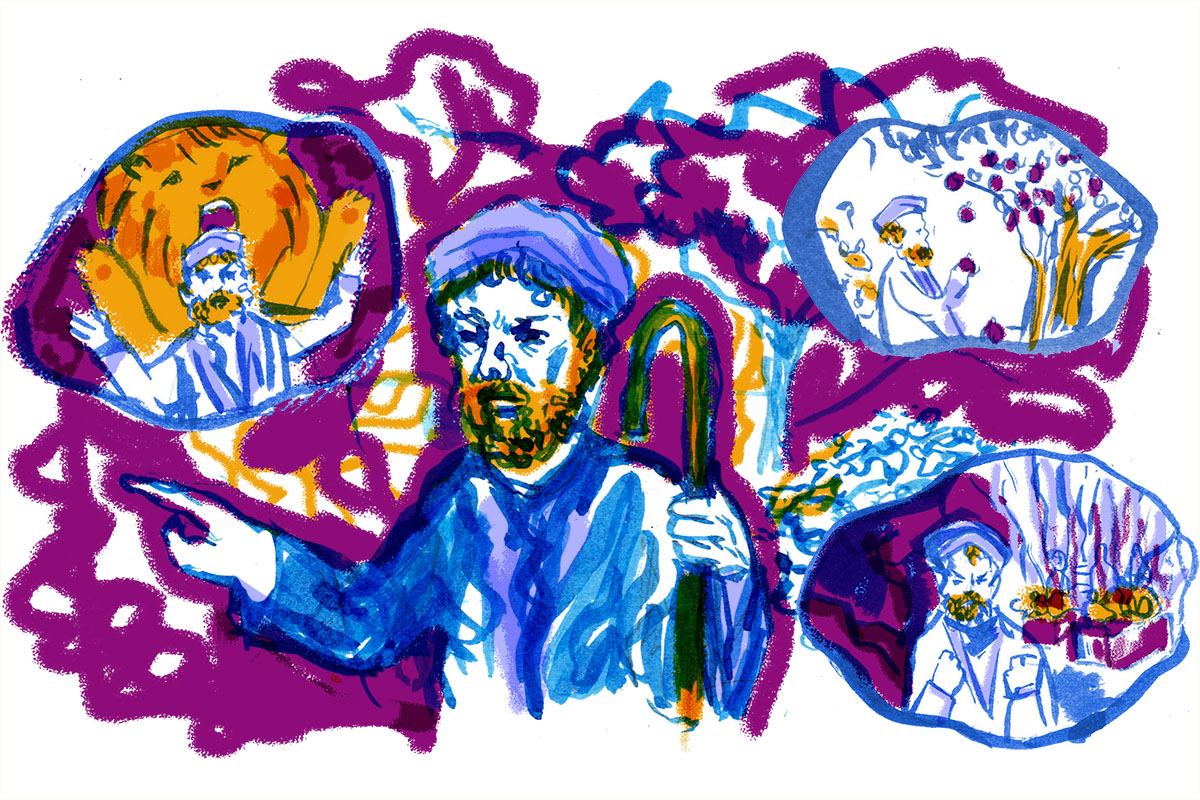A common canard used to denigrate Judaism is the accusation that Jews worship the supposedly “wrathful God of the Old Testament.” The God of Israel, so the stereotype goes, is an impetuous tyrant who rules the Jews through fear, demanding perfect obedience to pedantic rules and lashing out at anyone who violates them. People who want a gracious, compassionate God had best look elsewhere.
The biblical Book of Amos does little to undermine this stereotype. This prophet preaches God’s wrath with some of the most vivid and violent poetry the Bible has to offer. “The Lord roars from Zion, shouts aloud from Jerusalem,” he says at the beginning of the book, “and the pastures of the shepherds shall languish, and the summit of Carmel shall wither.” Amos 1:2
Amos is one of the Twelve Minor Prophets, the last volume of the prophetic books (the second section of the Hebrew Bible). His career unfolded during the seismic eighth century BCE. At the time, the Israelites had already split into two kingdoms: the northern kingdom of Israel, consisting of ten of the twelve Israelite tribes, and the southern kingdom of the tribe of Judah, which also included the tribe of Benjamin. In Amos’s day, these two small kingdoms were contending with the meteoric rise of the Neo-Assyrian Empire, whose influence and dominance spread across the entire region. The threat of Neo-Assyrian conquest cast a long shadow over Israel’s and Judah’s affairs. Not long after Amos, the mighty empire destroyed the northern kingdom, sweeping the ten tribes into an exile from which they would never return. The southern kingdom was merely subjugated. It survived, but only in diminished stature.
Though Amos hailed from the south, his prophetic career unfolded in the north. The authorities there did not take kindly to this outsider’s proclamations of divine wrath, which must have been quite politically subversive. What leader enjoys hearing that on their watch their society has provoked God’s fury? In one famous confrontation, Amaziah, a northern priest, told Amos to go back where he came from. Amos 7:10–17

Help us keep Jewish knowledge accessible to millions of people around the world.
Your donation to My Jewish Learning fuels endless journeys of Jewish discovery. With your help, My Jewish Learning can continue to provide nonstop opportunities for learning, connection and growth.
Yet while it is unsurprising that the authorities feared Amos’s words, it is remarkable that the prophet himself seemed to be terrified of them as well. He presents his prophecy not as his own words bubbling up from within, but rather as God’s words rushing in uncontrollably from the outside. “A lion has roared, who can but fear?” he asks. “My Lord God has spoken, who can but prophesy?” Amos 3:8 Amos takes no smug delight in what he says. It is simply the only possible response to his encounter with God.
This rage is the dominant characteristic of the Book of Amos. However, it would be a mistake to dismiss Amos as one-dimensional “fire and brimstone.” Contrary to the anti-Jewish stereotype, Amos’s God is furious with Israel not because the people have failed to uphold the intricacies of hairsplitting laws. Rather, he is furious with them because they have flagrantly flouted the most basic standards of human decency: “Because they have sold for silver those whose cause was just, and the needy for a pair of sandals. [Ah,] you who trample the heads of the poor into the dust of the ground, and make the humble walk a twisted course!” Amos 2:6–7 God rages against the powerful who oppress the powerless. For Amos, divine wrath is inseparable from divine justice.
Amos’s clearest call for justice is this declaration: “But let justice well up like water, righteousness like an unfailing stream.” Amos 5:24 These are the most famous words in the book because, millennia later, Martin Luther King, Jr. took them up as a religious rallying cry for the civil rights movement. However, the oft-neglected context of the verse is crucial. Just beforehand, Amos screams on God’s behalf:
I loathe, I spurn your festivals, I am not appeased by your solemn assemblies. If you offer Me burnt offerings—or your meal offerings—I will not accept them; I will pay no heed to your gifts of fatlings. Spare Me the sound of your hymns, and let Me not hear the music of your lutes. But let justice well up like water, righteousness like an unfailing stream. Amos 5:21–24
These verses are shocking. One would assume that God always desires lavish, enthusiastic worship. But Amos tells us that when worship is paired with injustice, God has nothing but contempt for it. Such worship is not only ineffective, it is infuriating––an active insult to God. Do the Israelites really think they can appease him with offerings of flesh and grain while the impoverished go hungry in the streets? Do they really think their celebratory songs can drown out the cries of those whom they oppress? This is the prophet’s most radical claim about divine justice and divine anger: moral rot poisons every pretense to piety.
The Book of Amos shows that the accusation that Jews worship a wrathful God is not negative, however negatively it is intended. God’s wrath blazes so fiercely because, not in spite of, God’s abounding compassion––specifically, his compassion for those who need it most: the weak and marginalized. Wrath and compassion are not mutually exclusive. They are two sides of the same coin; the former gives teeth to the latter, making it more than insipid sentiment.
This was true in Amos’s day, and it is true in our own. The Book of Amos is therefore not just a condemnation of the Jewish people. It is also, and more importantly, a challenge to them. When injustice reigns—when the most vulnerable of society are oppressed while their powerful tormenters get off scot-free—who would not be wrathful? When God has spoken, who would not prophesy?



